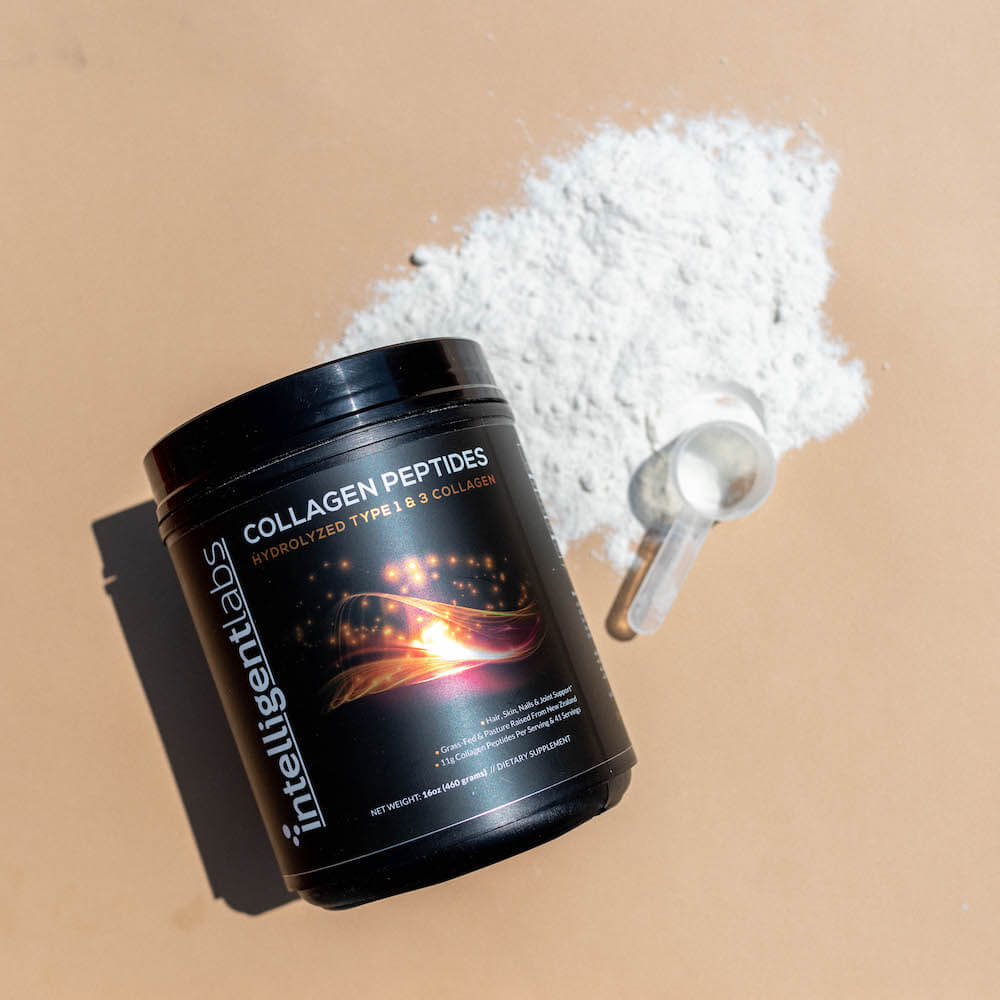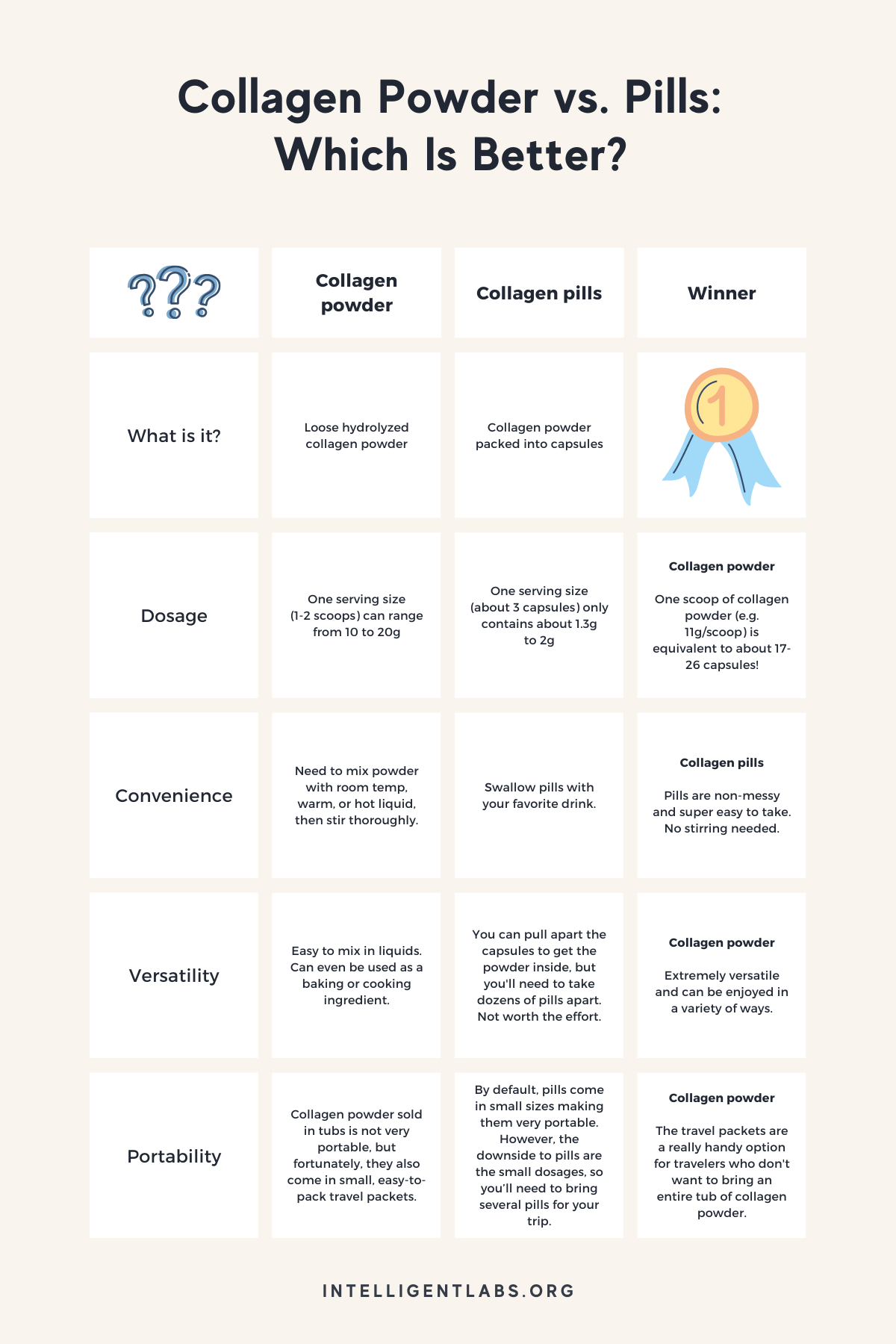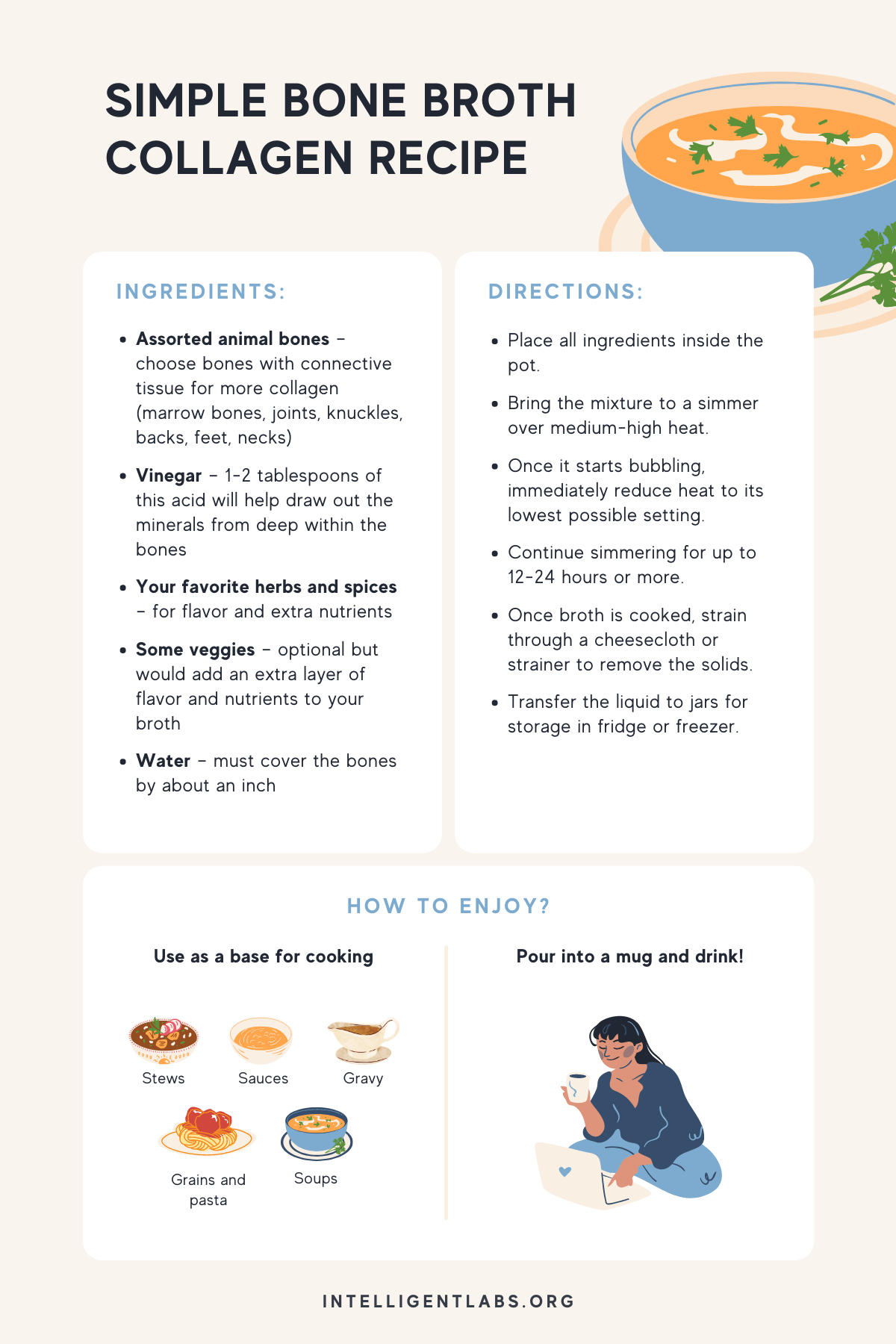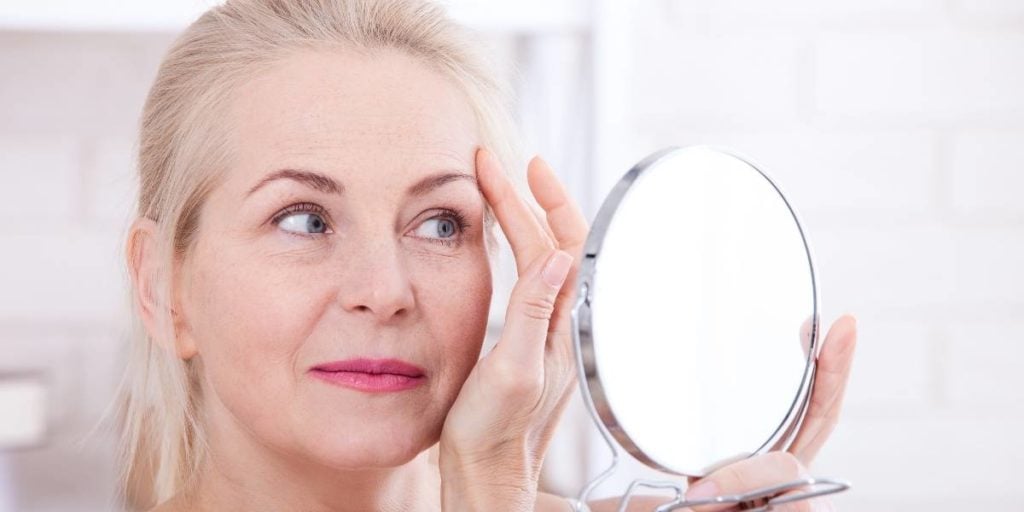Rebuild
Ultimate Guide To The Benefits Of Collagen Supplements
From baked goods to smoothies to supplements – collagen products are everywhere. They come in all forms and sizes, too. There’s collagen powder, capsules, liquid drops, soap, lotion, and gummies. But why are collagen products so popular? Are there any benefits to taking collagen supplements? You’ve got questions, we’ve got answers. Find out everything there is to know about collagen in this article.
TL;DR: Contrary to what many people think, Collagen isn’t a “vanity” supplement. There are science-backed health benefits to eating collagen-rich foods and/or taking collagen supplements.
Table of Contents
What is collagen?
The word “collagen” comes from the Greek words “kolla” (meaning glue) and “gen” (meaning producing). Combined together, collagen literally means “producing glue.” This is because collagen is the “glue” that holds the body together. How?
Well, collagen is the most abundant protein in the body. It’s a structural type of protein responsible for building and maintaining skin, nails, hair, muscles, bones, ligaments, tendons, and cartilage. It’s naturally made in the body by fibroblasts, tiny cells found in connective tissue.
When we grow older, however, collagen production declines. This is when wrinkles start showing up on our skin, hair and nails start to go dull and brittle, and our physical movements slowly become more limited. This is to be expected since less collagen means less structural support and elasticity (1).
There are at least 28 types of collagen. Here are the most common types:
| Collagen type | Where is it found? |
| Type I (most common type) | Skin, bones, tendon, ligament, organs, cornea, blood vessel walls, scar tissue |
| Type II | Cartilage, vitreous humor (eyes) |
| Type III | Skin, blood vessels, muscles |
| Type IV | Basal lamina |
| Type V | Hair, cell surfaces, placenta |
Functions of collagen fibers
Collagen molecules combine together to form collagen fibrils. These fibrils then form collagen fibers, which provide support and structure to connective tissues such as skin, ligaments, and tendons.
Types I, II, and III are the most common types of collagen and make up about 80-90% of total collagen in the body. But when it comes to strength, type I is definitely the strongest as it can withstand enormous forces. It is even said to be stronger than steel.
What is hydrolyzed collagen?
Hydrolyzed collagen is the result of enzymatic hydrolysis, the process which breaks down full-length native collagen into short chains of amino acids called peptides. It can be extracted from different animal sources, such as bovine (cow), porcine (pig), and marine sources (2).
Hydrolyzed collagen are also known as collagen peptides. These peptides are bioactive so the body will no longer need to make conversions for them to be beneficial (3). Once absorbed into the bloodstream, the peptides get to work. It repairs damaged tissue, contributes to healthy hair and nails, provides structural support for skin, and so much more!

What does collagen help with? The benefits of collagen supplements
Collagen accounts for nearly 25% to 30% of protein mass in the body (1), so it’s not surprising at all that it has a wide range of health benefits. Here’s a table summary to help you get acquainted with collagen’s wonders. Scroll down for the details and references.
| Body part | How collagen can help |
| Skin | Reduces wrinkles, less skin dryness, stronger and more radiant skin |
| Hair | Promotes hair growth, healthier follicles, prevents thinning, slows down graying |
| Nails | Improves nail thickness and prevents brittleness, boosts nail growth |
| Eyes | Improves eyesight, helps eyes stay young, prevents ocular diseases |
| Bones | Reverses bone loss, increases bone density, strong bones and joints, more flexibility |
| Teeth and gums | Strengthens teeth enamel, prevents cavity and decay, heals mouth ulcers, prevents tooth loss |
| Internal organs | Improves gut health, heart health, protects against brain disease |
| Muscles | Faster recovery after exercise, reduces sports injuries, boosts muscle mass |
| Appearance | Look younger than your age, be healthier, feel more confidently beautiful! |
How does collagen help the skin?
The skin is the body’s largest organ. Some of its functions include acting as a barrier against the environment (including pathogens), regulating the body’s temperature, preventing dehydration, and providing us a sense of touch (4).
A 2019 review reported that oral collagen supplementation helped with both wound healing and skin aging. It also helped with skin hydration and elasticity, as well as dermal collagen density (5). All these skin improvements can lead to less skin dryness, fewer wrinkles, and stronger and more radiant skin!
How does collagen help the hair?
If you think your crowning glory is starting to thin or fall out in greater number these days, read on. Hair not only makes us look good (or awful), but it also offers protection and body temperature regulation.
Hair is primarily made with keratin, a tough protein that makes hair and nails in humans. Keratin’s main component is the amino acid proline (one of the 3 amino acids that make up the bulk of total amino acids in collagen) (6). Supplementing with collagen with a high proline content (check the label at the back) provides your body with the amino acids it needs for hair growth (6).
Additionally, collagen also has antioxidant properties. According to a 2015 study, oxidative stress cause hair fibers to exhibit age-related changes, such as premature greying and thinning (7). Supplementing with collagen for hair should help lessen the impact of oxidative stress on your locks.
How does collagen help the nails?
Just like hair, nails are also made primarily of keratin. Nails protect our fingers and toes from injury and allows us to make precise movements, such as picking up and holding on to tiny items.
A recent collagen study showed promising results in women with brittle nail syndrome. After taking 2.5g of collagen peptides daily for 24 weeks, the women experienced an improvement in nail growth and a significant reduction in brittle and broken nails (8).
How does collagen help the eyes?
Collagen is one of the building blocks of the cornea, the transparent outermost lens of the eyes. It’s responsible for controlling the entry of light into the eyes, as well as protecting the eye against infections. It also helps form part of the vitreous humor, the fluid that fills the space between the lens and the retina.
One of the benefits of collagen supplements is that they can help maintain eye health. Increasing collagen stores in your body can help improve your eyesight, prevent dry eyes, and reduce eye diseases like cataracts and glaucoma (9).
How does collagen help the bones?
Declining collagen production leads to deterioration in bone mass, which can lead to bone weakness and osteoporosis (10). This isn’t surprising since the human bone is made mostly of collagen. Think of collagen as the scaffold that provides external structure to the bones, and the calcium makes up the internal component. Bone tissue never stays the same, it can heal and repair itself.
Fortunately, bioactive collagen peptides can help increase bone mineral density and reduce bone degradation. This was the outcome reported in a study conducted on postmenopausal women who took 5g of collagen daily for one year (11).
Moreover, when it comes to calcium vs collagen for bone health, one study showed that taking a calcium-collagen chelate along with vitamin D yielded far better results than taking only a calcium and vitamin D combo. The collagen group showed lower blood biomarkers of bone turnover as well as improvements in bone mineral density (12).

How does collagen help the teeth and gums?
Healthy gums prevent tooth loss, mouth ulcers, and tooth decay. When it comes to teeth and gum health, collagen isn’t probably the first thing that comes to most people’s minds. But collagen is important in tooth enamel formation and a deficiency can cause defective enamel to form (13).
Collagen can also help heal receding gums. One study used bovine collagen implants to hold damaged teeth in place. After 6 months, all 14 patients showed improvements in gum thickness. A significant 86.7% of exposed roots were also covered (14).
How does collagen help the internal organs?
Type I collagen is found in our internal organs, such as our brain, heart, gut, and more. By supplementing with bioactive collagen peptides, your internal organs may also benefit. Here’s what the science says about collagen’s effect on some internal organs:
Brain
Collagen may help Alzheimer’s patients. Research has shown that collagen protects the brain against amyloid-beta proteins, the main component of plaques found in Alzheimer-affected brains (15).
Another study that investigated the effects of collagen on brain structure and language cognitive function reported promising results. 5g of collagen hydrolysate were given daily for 4 weeks to healthy subjects. By the end of the study, the subjects had improved brain structure, word list memory, and cognitive function (16).
Heart
Collagen may help prevent and treat atherosclerosis, a disease where plaque (made of fats, cholesterol, etc.) builds up in the arteries. This condition can limit the flow of oxygen-rich blood and can lead to stroke, heart attack, or death.
Volunteers who took collagen 2x a day (total intake of 16g daily) for 6 months experienced significantly lower LDL to HDL cholesterol ratio, which means a reduction in risk for contracting heart disease (17).
Digestive tract
Patients suffering from inflammatory bowel disease, specifically Crohn’s disease and ulcerative colitis, have low concentrations of type IV collagen (18). Both are painful conditions that can make life really uncomfortable for anyone affected.
To help combat these conditions, eat collagen-rich food or take collagen peptides. Doing so may help treat these gut issues since the tissues that line the GI tract are made from the same amino acids that make up collagen (19).
Check out this blog post for more reasons to take collagen for gut health.
How does collagen help the muscles?
Research has shown that collagen can help with faster muscle recovery after strenuous exercise. This was evident in one study where the group taking 20g of collagen peptides daily weren’t as sore as those taking placebo. While the researchers didn’t find any evidence of collagen helping with muscle inflammation, they did report that it helped with muscle recovery from countermovement jumps (20).
Another study gave a group of men 15g of collagen daily for 12 weeks, another group got placebo. Both groups did resistance exercise training 3x a week. As you can probably guess, the collagen group came out ahead. They showed improved body composition as well as an increase in fat-free muscle mass (21).
How does collagen help your appearance?
As you’ve learned so far, the benefits of collagen supplements are wide-ranging. From the biggest organ – the skin – all the way to your internal organs, collagen will make you look good from the inside out. Feel more confident as you go out into the world with more lustrous hair, younger-looking skin, healthier nails, and so much more!
Collagen powder vs pills – which is better?
Hydrolyzed collagen can come in many different forms, but the most common are collagen powder and collagen pills. They do offer the same benefits; however, collagen pills are basically just collagen powder stuffed inside a pill. So, to get the same amount of collagen peptides as collagen powder, you may need to take 5 or 6 collagen pills daily. I don’t know about you, but I find this to be highly inconvenient…
Personally, I would go for collagen powder. Get a scoop of your favorite collagen brand, mix it into your morning coffee or tea, and you’re good for the day. Find out when’s the best time to take collagen powder here.
Here’s a table comparing the pros and cons of collagen powder vs pills:
| Type of collagen | Pros | Cons |
| Collagen powder | One scoop a day Easy to mix with favorite beverage Can also mix in soups Neutral taste (may depend on brand) Can easily adjust the dosage | Not portable |
| Collagen pills | More portable than powder form Can easily adjust the dosage | Will need to take several large pills a day |

Who can take collagen supplements? Can pregnant women take it?
Men and women who pay close attention to their health should consider adding collagen to their diet, either in the form of food or supplements. In the previous sections, we’ve learned about collagen’s role at the cellular level. We’ve also discussed several documented benefits of collagen supplements inside and outside the body.
That being said, even pregnant women and nursing mothers may take collagen supplements (of course, make sure you get your doctor’s approval before doing so!). One study showed that pregnant and breastfeeding women who took collagen showed improved wound healing rates, protein levels, and overall quality of life (22).
As for guys, check out this in-depth post on why men should take collagen.
Benefit from collagen supplements – how much collagen to take for best results?
Collagen supplement manufacturers offer different serving sizes for their products. For example, some brands only have 5g of collagen per serving. Others can go up to 11g or more per serving. Each brand would also have different amino acid profiles, so make sure you check the labels carefully.
There is currently no official guideline on how much collagen to take. But one study suggests that 2.5g to 15g per day is safe (23). Effective amounts of collagen peptides will vary on your reason for taking it. Here’s a guide:
| Collagen can help with your… | How much collagen peptides to take to see any benefits? |
| Skin, hair, and nails | A systematic review showed that 2.5g to 10g per day for dermatological purposes is fine (5) |
| Bone health | Two studies show 5g of collagen peptides helped with bone loss reduction and improvement in bone mineral density (11, 12) |
| Internal organ (brain) health | For brain health, 5g daily was enough to show positive effects on brain structure and language cognitive function (16) |
| Internal organ (heart) health | 16g of collagen daily brought about significant results for heart health (17) |
| Muscle health | 15-20g daily helped with muscle recovery, body composition, and increase in fat-free muscle mass (20, 21) |
| Oral and optical health | Under 15g of daily collagen supplementation should suffice to experience improvements (23) |
Foods with collagen
Collagen-rich food is the best source of collagen because it is also packed with other important nutrients. Bone broth from beef, chicken, pork, or fish bones is the best collagen-boosting food, but this usually requires a day or two of simmering over low heat.
If you don’t have the time to prepare your broth from scratch, there are readily available liquid bone broths that are sold in cans or cartons. You’ll also find bone broth in powder form. You can drink the broth or use it as a stock for other dishes (yum!).
If you’re tired of drinking bone broth, you can also eat lots of protein-rich foods. Your body can synthesize collagen from the amino acids and other nutrients in the foods you eat.
Here’s a simple bone broth collagen recipe. Enjoy!

Conclusion
Now you know why collagen products are so popular – the benefits of collagen supplements go beyond skin deep. Since collagen is essential to our very existence, you’ve literally got nothing to lose and everything to gain! For high-quality collagen peptides, check out our Intelligent Labs Multi Collagen Powder sourced from grass-fed and pasture-raised bovine from New Zealand.
💬 Something on your mind? Share your thoughts in the comments. We love hearing from curious minds.
📩 And while you’re here, join our newsletter for more smart stuff (and secret perks)!
References
(1) Collagen structure and stability. Shoulders MD, Raines RT. Annu Rev Biochem. 2009;78:929-958.
(2) Hydrolyzed Collagen—Sources and Applications. León-López, A.; Morales-Peñaloza, A.; Martínez-Juárez, V.M.; Vargas-Torres, A.; Zeugolis, D.I.; Aguirre-Álvarez, G. Molecules 2019, 24, 4031.
(3) Functional and bioactive properties of collagen and gelatin from alternative sources: A review, Food Hydrocolloids, M.C. Gómez-Guillén, B. Giménez, M.E. López-Caballero, M.P. Montero, Volume 25, Issue 8, 2011, Pages 1813-1827,
(4) Anatomy, Skin (Integument) Lopez-Ojeda W, Pandey A, Alhajj M, et al.[Updated 2022 Oct 17]. In: StatPearls [Internet]. Treasure Island (FL): StatPearls Publishing; 2023 Jan
(5) Oral Collagen Supplementation: A Systematic Review of Dermatological Applications. Choi FD, Sung CT, Juhasz ML, Mesinkovsk NA. J Drugs Dermatol. 2019;18(1):9-16.
(6) The structure of people’s hair, Fei-Chi Yang, Yuchen Zhang, Maikel C. Rheinstädter, Published October 14, 2014
(7) The impact of oxidative stress on hair, R. M. Trüeb, First published: 17 November 2015
(8) Oral supplementation with specific bioactive collagen peptides improves nail growth and reduces symptoms of brittle nails, Doris Hexsel MD, Vivian Zague PhD, Michael Schunck PhD, Carolina Siega BSc, Fernanda O Camozzato MD, Steffen Oesser PhD, First published: 08 August 2017
(9) Possible role of lens collagen in cataractogenesis. Mishra G, Das GB, Behera HN. Indian J Ophthalmol. 1997;45(4):227-231.
(10) The role of collagen in bone strength. Viguet-Carrin, S., Garnero, P. & Delmas, P.D. Osteoporos Int 17, 319–336 (2006).
(11) Specific Collagen Peptides Improve Bone Mineral Density and Bone Markers in Postmenopausal Women—A Randomized Controlled Study. König D, Oesser S, Scharla S, Zdzieblik D, Gollhofer A. Nutrients. 2018; 10(1):97.
(12) A Calcium-Collagen Chelate Dietary Supplement Attenuates Bone Loss in Postmenopausal Women with Osteopenia: A Randomized Controlled Trial, Marcus L. Elam, Sarah A. Johnson, Shirin Hooshmand, Rafaela G. Feresin, Mark E. Payton, Jennifer Gu, and Bahram H. Arjmandi, from: https://www.liebertpub.com/doi/10.1089/jmf.2014.0100
(13) Type VII Collagen Deficiency Causes Defective Tooth Enamel Formation due to Poor Differentiation of Ameloblasts, The American Journal of Pathology, Hiroko Umemoto, Masashi Akiyama, Takanori Domon, Toshifumi Nomura, Satoru Shinkuma, Kei Ito, Takuya Asaka, Daisuke Sawamura, Jouni Uitto, Motohiro Uo, Yoshimasa Kitagawa, Hiroshi Shimizu, Volume 181, Issue 5, 2012, Pages 1659-1671,
(14) Bovine pericardium based non-cross linked collagen matrix for successful root coverage, a clinical study in human. Schlee M, Ghanaati S, Willershausen I, Stimmlmayr M, Sculean A, Sader RA. Head Face Med. 2012;8:6. Published 2012 Mar 5.
(15) Gladstone Institutes. “Collagen May Help Protect Brain Against Alzheimer’s Disease.” ScienceDaily. ScienceDaily, 10 December 2008.
(16) Effects of Collagen Hydrolysates on Human Brain Structure and Cognitive Function: A Pilot Clinical Study. Koizumi, S.; Inoue, N.; Sugihara, F.; Igase, M. Nutrients 2020, 12, 50.
(17) Effect of Collagen Tripeptide on Atherosclerosis in Healthy Humans. Tomosugi N, Yamamoto S, Takeuchi M, et al. J Atheroscler Thromb. 2017;24(5):530-538.
(18) Serum laminin and collagen IV in inflammatory bowel disease. Koutroubakis IE, Petinaki E, Dimoulios P, et al. J Clin Pathol. 2003;56(11):817-820.
(19) Collagen synthesis by human intestinal smooth muscle cells in culture, Martin F. Graham, David E.M. Drucker, Robert F. Diegelmann, Charles O. Elson, Gastroenterology, Volume 92, Issue 2, 1987, Pages 400-405,
(20) The effects of collagen peptides on muscle damage, inflammation and bone turnover following exercise: a randomized, controlled trial. Clifford, T., Ventress, M., Allerton, D.M. et al. Amino Acids 51, 691–704 (2019).
(21) Prolonged Collagen Peptide Supplementation and Resistance Exercise Training Affects Body Composition in Recreationally Active Men. Kirmse M, Oertzen-Hagemann V, de Marées M, Bloch W, Platen P. Nutrients. 2019; 11(5):1154.
(22) Response to Hydrolysed Collagen Protein Supplementation in a Cohort of Pregnant and Postpartum Women, Leon Baginski, Marc Winter… Journal of Pregnancy and Child Health 3(5)
(23) Significant Amounts of Functional Collagen Peptides Can Be Incorporated in the Diet While Maintaining Indispensable Amino Acid Balance. Paul C, Leser S, Oesser S. Nutrients. 2019; 11(5):1079.




